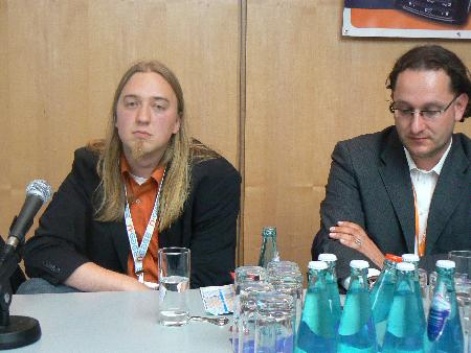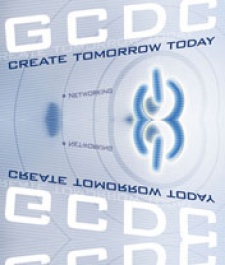Michael Schade of Fishlabs is on this panel too his 17th of the day, seemingly. His company doesn't make PC games, but it is interested in browser games, since the audience of casual gamers is relatively similar to mobile.
"If you find a design that works very well on a mobile phone, you can bring it to the browser, even 3D Java games," he says. "You can try the game for free in your browser, then continue on mobile. So that's how we would look at publishing cross-platform games."
Next up is Arne Peters from cdv Software Entertainment, who says there aren't any multiplatform strategies that include PC, consoles and handhelds, and says that developers are being "very opportunistic" in taking their games from mobile to PC or DS, and vice versa. "There's no strategy behind it."
That's not necessarily a criticism I think he means that developers are just porting individual games to experiment, rather than truly having a "vision" for cross-platform publishing.
"Handhelds are very capable of handling graphics to play a game, but it doesn't have to be the same experience as you get on a PC," he says.
Nokia's Kay Gruenwoldt is also on this panel there's been quite a rotation of speakers today. He says cross-platform gaming is a risk.
"There are examples out there. Some from an IP perspective, where a brand is developed on mobile and then taken to PC. And then others where you can truly play cross-platform, like our own Reset Generation."
He also thinks free-play comes into this. "We are trying to have that component that is running on the PC completely free, running in the browser window. But we believe the added value of having it mobile, having it with you, will make people purchase it for that platform."
He admits that "not every developer out there" can do that. I'd argue making Reset Generation free on the web is as much about selling N-Gage handsets as it is selling the N-Gage game, and the rewards of the former for Nokia are clearly larger than for a publisher selling a £5 game.

Peters doesn't seem entirely convinced, though. "If you don't make money on the PC side, why would a traditional PC-based publisher get involved? If he participated in your mobile sales, then it would make sense for the PC publisher as well."
So there are two sides to this how publishing a game on other platforms can increase sales of a mobile game, or how a mobile game can act as an integrated part of a game on other platforms (the idea of a World of Warcraft spin-off mobile app has already been mooted, you'll be unsurprised to learn).
"I cannot believe that nobody has done this yet," says Gruenwoldt. "It's crazy! I'm not even talking about World of Warcraft 3D on a mobile."
Kassulke chips in, saying the reason is that PC publishers are "afraid of mobile", and also points out that there's no chance of doing cross-platform stuff with DS. "Nintendo won't allow you to connect a mobile game with a DS game, and you can't even put a flyer in a box," he says.
Peters is from a PC publisher, and the panel is shaping up interestingly with the other three asking, "How can we convince you to do something with us?"
Kassulke says slippage is an additional problem, too. How can you release a mobile game at the same time as a PC game, when the PC game's release date is quite likely to slip by a few months?
Peters says that mobile guys should turn their attentions away from complex games like WoW, and look at doing cross-platform casual games instead, with mobile and browser-based titles.
Nokia's Gruenwoldt has some interesting thoughts on Reset Generation, saying Nokia debated how much of the game to make available on the web for free, and eventually decided to make the whole thing available.
"I wish I had some numbers to show if that's working," he says. "Ask me next year! We knew from the beginning that we weren't going to make any money from the PC version."
He continues: "But this is a marketing tool for us first and foremost, because it will drive traffic to our websites, and it will hopefully translate to sales on the mobile platform. Instead of going out and buying advertisements, we made the game the advertisement."
Volker Hirsch from Connect 2 Media (from the audience) chips in, pointing out that for many games, actual cross-platform multiplayer won't work playing BioShock on a phone against someone on an Xbox 360 for example but he cites the example of Hands-On Mobile's own World Poker Tour game as a successful example, where mobile players are playing against web players.
"When it comes to the PC downloadable and console versions of that, which do exist, the problem emerges of co-ordination with the publishers of those, and it's just impossible. But the web client, we do ourselves. When we talk multi-platform, quite a few of these things exist, and we make money with them."
Schade now, who says there's people playing mobile Java games on their PC in an emulator. "They say it's much easier," he offers. "If it's a complex game, they might be played on the PC. That's why we believe browser games are closer to mobile games than high-end console or PC games."
Someone from the audience asks what the panel thinks about interactive TV (perhaps the only platform that may actually be more restrictive than mobile!). They don't have much to say about it, though the discussion veers off into mobile TV, then the first ever colour-screen mobile phones. I'm not sure how.
One question: do console or PC gamers even want to interact with their favourite brands from those platforms on a mobile at all? Wouldn't they rather play simple puzzle games on their phones instead?
Schade says that, yes, if somebody is going for high-end 3D immersive games on their PC, they'll "still be happy with a good game" on their phone of any type.
Gruenwoldt says that from an IP view, it's completely different. FIFA console players don't want to be sold the same experience, but that if a publisher can isolate the thing they love about the gameplay of the original version, and present it to them in a great mobile game, then they will play it.
And that's a wrap for the day.





















